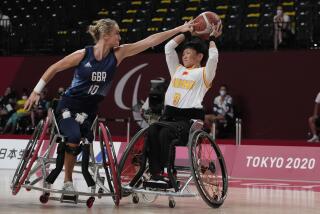HARD TO FIGURE : World Cup Track Meet Starts Today in Spain With Odd Format
- Share via
BARCELONA, Spain — Tonight at the Montjuic Olympic Stadium, King Juan Carlos of Spain will open track and field’s World Cup, a three-day meet that is being held for the fifth time since 1977 but still has to be explained.
That is unfortunate because it has the potential of being one of the best meets since the 1988 Olympic Games.
The format, however, has yet to catch on so that anyone other than the sport’s aficionados would notice. In other words, it is not the Olympics or even the World Championships, which have been in existence only since 1983.
There are nine teams in both the men’s and the women’s divisions, including four representing countries.
The United States and the host country, Spain in this case, have standing invitations. Also, the top two teams in the European Cup are invited. For the men, that is Great Britain and East Germany. For the women, it is East Germany and the Soviet Union.
The field is completed with all-star teams from Africa, the Americas, Asia, Europe and Oceania (Australia and New Zealand).
Each of the nine teams is represented by one competitor in 36 events, all finals.
Some of the sport’s greatest performers are entered here--Morocco’s Said Aouita in the 5,000 meters, Great Britain’s Sebastian Coe in the 1,500, the United States’ Roger Kingdom in the high hurdles, Cuba’s Javier Sotomayor in the high jump, East Germany’s Silke Moeller in the women’s 100 and 200, Romania’s Paula Ivan in the women’s 1,500, Cuba’s Ana Quirot in the women’s 400 and 800, and Norway’s Ingrid Kristiansen in the women’s 10,000.
But there also are two or three athletes in each event who will not be competitive. Good hosts they may be, but the Spanish belong in hardly any of the events, much less all of them. The same can be said for the Asians. Japan’s Kazuhiro Mizoguchi is an obvious exception, having thrown the javelin farther than anyone else in the men’s field.
The International Amateur Athletic Federation has discussed eliminating the World Cup, which now is held every four years, and scheduling the ultra-successful World Championships at two-year intervals instead of four.
But IAAF President Primo Nebiolo of Italy said Thursday that there will be another World Cup in 1993, although a site has not been selected.
Nebiolo said that the World Cup “unites the athletes of different continents.”
Perhaps so. But he would have gotten an argument from the French Thursday, when their excellent pole vaulter, Philippe Collet, lost his place on the European team to the Soviet Union’s Rodion Gataullin.
Gataullin originally was in the World Cup as a member of the Soviet team, which finished second to Great Britain in the European Cup. But then the drug-testing results came down.
Soviet shotputter Alexander Bagach tested positive for a banned substance and lost his third-place points, which moved East Germany ahead of the Soviets and into the World Cup.
But because Gataullin won the pole vault in the European Cup, it was determined that he should represent Europe, instead of Collett, who was the original selection and already was here to train.
Thursday, French officials walked around indignantly, which they do better than anyone else in the world.
The Africans, as usual, were waist-deep in intrigue. They had announced earlier this year that only athletes who competed in the African Championships at Lagos, Nigeria, would be eligible for the World Cup.
No one, however, tells Aouita where to compete. So he did not go to Lagos. But he still wanted to come here to run the 1,500. Under pressure from Nebiolo, the Africans relented.
But Somalia’s Abdi Bile, the 1987 world champion at 1,500 meters, said he wanted to run that race. He also did not go to Lagos, saying that he had the flu and also visa problems. Take your pick.
African officials announced this week that Bile will run the 1,500 and Aouita the 5,000, a race that he won in the 1984 Olympics and the 1987 World Championships.
Whether Aouita is happy with the compromise has not been determined. As of Thursday afternoon, he had not reported for duty. Kenya’s John Ngugi, the 1988 Olympic champion at 5,000 meters who did go to Lagos, is standing by, just in case.
The United States left its problems at home, along with some of its best athletes. Of eight U.S. individual champions from the Seoul Games, the only one here is Kingdom. Six of the seven others chose for one reason or another not to attend the qualifying meet, the national championships in June at Houston.
Jamaican-born but raised in Brooklyn and college-educated at Cal State L.A., Sandra Farmer-Patrick will compete for the first time in a U.S. uniform in the 400-meter intermediate hurdles. She is favored. Her husband, David Patrick, will represent the U.S. men in the intermediate hurdles.
More to Read
Go beyond the scoreboard
Get the latest on L.A.'s teams in the daily Sports Report newsletter.
You may occasionally receive promotional content from the Los Angeles Times.






